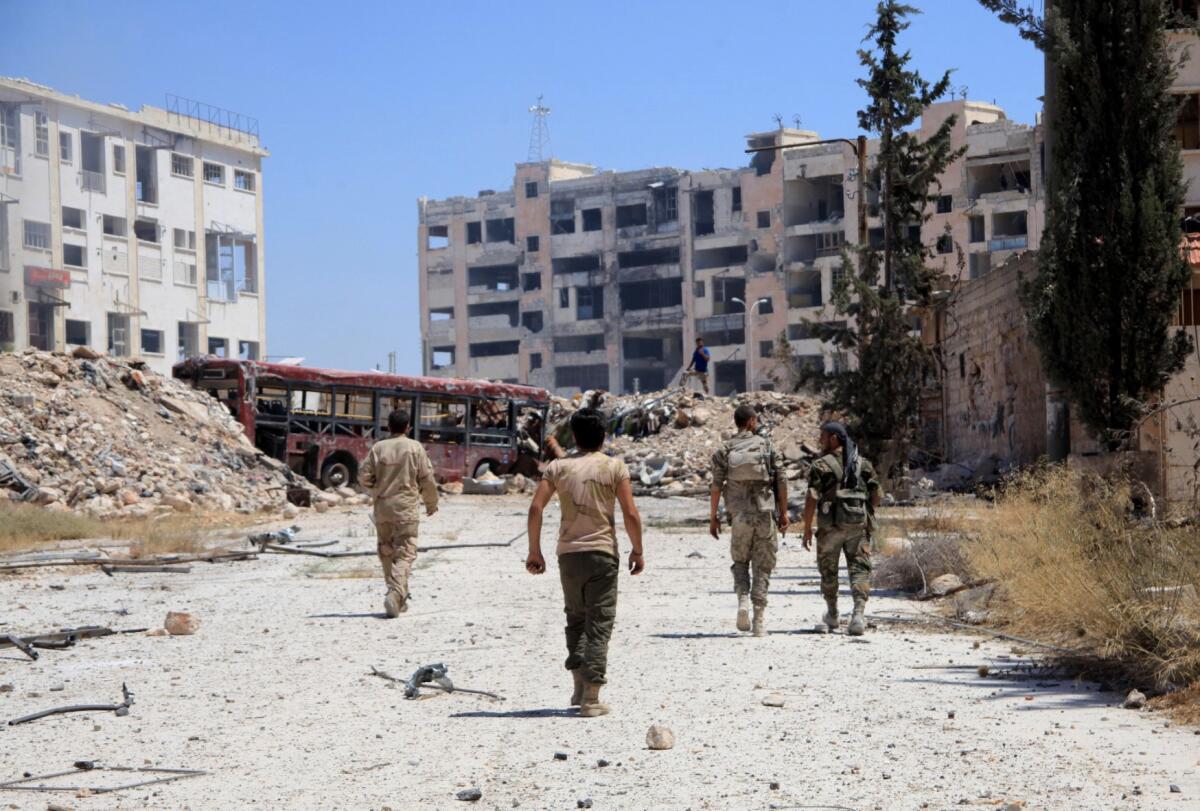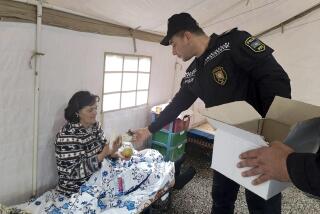Syria’s Assad offers amnesty to rebels, who call it ‘meaningless’

Reporting from Amman, Jordan — Syrian President Bashar Assad issued a general amnesty to rebels willing to lay down their arms on Thursday, state media said, but few, if any, were expected to accept the offer, which was widely seen as a ruse.
At about the same time, Russia, Syria’s staunchest ally, announced the creation of safe corridors to allow civilians to leave besieged areas of Aleppo city.
“Whoever bore arms… and had escaped from justice… is pardoned from all punishment when they surrender themselves and their weapons to authorities… within three months,” read the amnesty decree, whose text was published by Syrian state news service SANA.
The edict also offered pardons for anyone ensuring the release of kidnapped and missing people. Since the beginning of the Syrian civil war in 2011, thousands have been kidnapped and detained, mostly by forces loyal to Assad but also by the opposition pitted against him.
It specifically included a provision, however, that said private citizens retain their right to sue, presumably meaning that rebel forces could be sued for damages or deaths they caused.
A spokesman for Ahrar al Sham, a hardline Islamist faction, used one word to describe the offer: “Meaningless,” he said in an interview on social media. He did not give his full name for reasons of security.
“No one will even consider it,” he added.
The amnesty comes as the government declared its complete encirclement of rebel-held areas of Aleppo, Syria’s largest city and one-time industrial powerhouse. Rebel factions have held sway over Aleppo’s eastern neighborhoods since 2012, but the government controls its western areas.
Until recently, the opposition also controlled large swaths of Aleppo countryside areas, allowing aid groups and merchants to ferry supplies from Turkey to the some 300,000 people living in rebel-held parts of the city. It also granted rebel factions a vital passageway to transport men and materiel, and mount attacks on government forces.
But a wide-scale, Russian-backed government campaign has locked down the area. On Wednesday, pro-government forces completed a pincer maneuver northwest and southwest of the city, tightening a siege that has been effectively in place since earlier this month despite repeated counter-offensives by the rebels.
Ali Haydari, Syria’s minister of reconciliation, who is responsible for bringing rebels “back to the bosom of the government,” hailed Assad’s decree as “the most complete amnesty to date.”
This has been the clearest and most comprehensive pardon we have seen yet.
— Ali Haydari, Syriaâs minister of reconciliation
“This has been the clearest and most comprehensive pardon we have seen yet, and it involves kidnappers, which wasn’t the case in previous amnesties,” he said in a phone interview from Damascus, the capital, on Thursday. There have been nine such amnesties offered since the beginning of the crisis.
“As long as they are willing to lay down their arms, they are welcome to stay where they are,” he said.
“Some read in the past that these decrees were a sign of weakness [from the government],” Haydari said, “but as we see now, they come before a backdrop of victories by the army in Aleppo, and they open the door wide for forgiveness from a position of strength.”
Three opposition groups inside Aleppo had already begun negotiating their surrender, he said. There was no confirmation of that from the opposition.
Many on the opposition’s side, however, believe the reconciliations are little more than a ruse to have them surrender so the government can continue punishing them out of sight.
They claim that those who have taken the government’s past offers have been “disappeared” and tortured for their participation in the fight against Assad’s rule.
Haidari dismissed those concerns.
“If those people who reconciled had been pursued and arrested, then there would have been no more reconciliations. But we have seen hundreds enroll in this process,” he said.
“To the contrary, trust in this has increased.”
Yet the same suspicion extended to statements made by Russian Defense Minister Sergei Shoigu, who announced on Thursday that Russia, in cooperation with Syrian authorities, would open “three humanitarian corridors” so as to “assist civilians taken hostages by the terrorists, as well as militants who chose to lay down their weapons.”
A fourth corridor in the northeast, Shoigu added, would be open to militants who refused to stop fighting. As was the case in similar arrangements forged in the central province of Homs and elsewhere, these militants would be allowed to exit the area with their personal weapons.
“I want to emphasize that we are taking this step, first and foremost, to ensure the safety of Aleppo residents,” said Shoigu, according to Russian broadcaster Russia Today.
Government and opposition activists on social media circulated images of a map indicating the location of the safe passages, and Syrian state TV announced three of them were already open and were ready to receive those fleeing the violence in “temporary housing centers” equipped with all necessary services. It added that the Nusra Front, Al Qaeda’s affiliate in Syria, had prevented people from leaving rebel-held areas.
Yet opposition-aligned community pages on Facebook said that one of the specified corridors, in the Saif al Dawlah neighborhood of the city, had been the target of an airstrike they said had killed one person and wounded others.
The strikes occurred even as other planes delivered aid drops containing tea bags, sugar, crackers and packets of what was said to be ketchup on the besieged eastern neighborhoods, according to pictures of the packages circulated on social media.
The packets included material with Cyrillic writing, suggesting they were from Russia, although an activist, speaking on condition of anonymity for security reasons, said they were dropped by Syrian government helicopters.
Meanwhile, Usama Taljo, a member of the opposition’s Aleppo City Council, denied any passage had been open.
Another activist, Maher Thalji, said the location of the corridors proved the government was not to be trusted.
“All these passageways lead to sections under regime control. Had they really cared about civilians’ well-being, they would open up to all areas and let people choose,” he said in an interview on social media on Thursday.
He also cast doubt that any rebels would choose surrender.
“If civilians aren’t even thinking of handing themselves over, how would any rebel do so and give up their arms? They know it would inevitably lead to their end,” he said.
His words were echoed by the Ahrar al Sham spokesman:“It’s a long war. The regime has been trying to besiege Aleppo for three years. But the battle has not finished yet.”
Bulos is a special correspondent.
MORE WORLD NEWS
Citizen science takes on Japan’s nuclear establishment
U.S. expands refugee program for Central American families
Here’s why Netanyahu is apologizing to Israel’s Arab citizens
More to Read
Sign up for Essential California
The most important California stories and recommendations in your inbox every morning.
You may occasionally receive promotional content from the Los Angeles Times.











